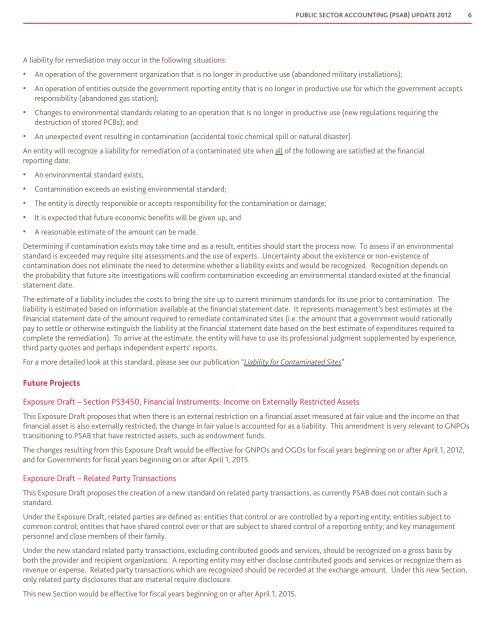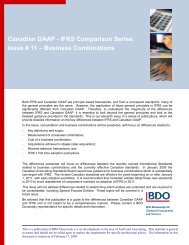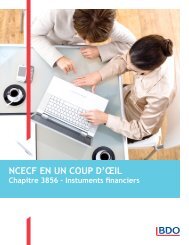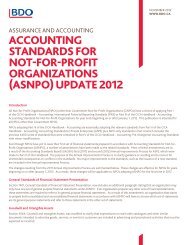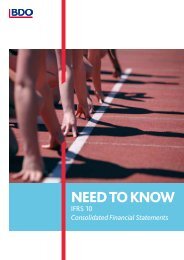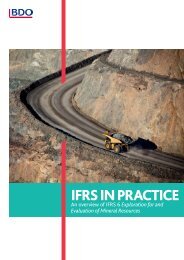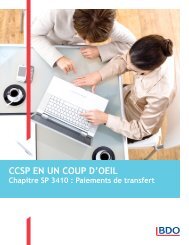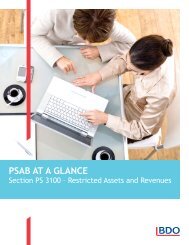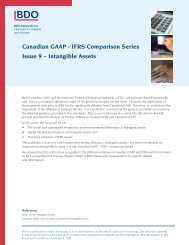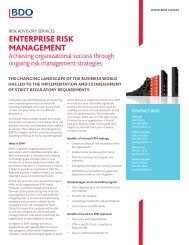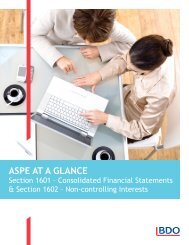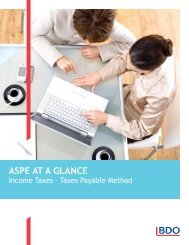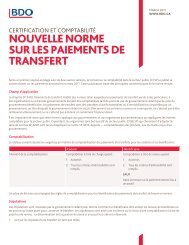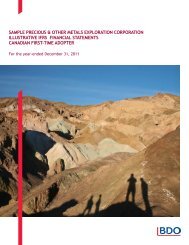Public Sector Accounting (PSAB) Update 2012 - BDO Canada
Public Sector Accounting (PSAB) Update 2012 - BDO Canada
Public Sector Accounting (PSAB) Update 2012 - BDO Canada
Create successful ePaper yourself
Turn your PDF publications into a flip-book with our unique Google optimized e-Paper software.
PUBLIC SECTOR ACCOUNTING (<strong>PSAB</strong>) UPDATE <strong>2012</strong><br />
6<br />
A liability for remediation may occur in the following situations:<br />
• An operation of the government organization that is no longer in productive use (abandoned military installations);<br />
• An operation of entities outside the government reporting entity that is no longer in productive use for which the government accepts<br />
responsibility (abandoned gas station);<br />
• Changes to environmental standards relating to an operation that is no longer in productive use (new regulations requiring the<br />
destruction of stored PCBs); and<br />
• An unexpected event resulting in contamination (accidental toxic chemical spill or natural disaster).<br />
An entity will recognize a liability for remediation of a contaminated site when all of the following are satisfied at the financial<br />
reporting date:<br />
• An environmental standard exists;<br />
• Contamination exceeds an existing environmental standard;<br />
• The entity is directly responsible or accepts responsibility for the contamination or damage;<br />
• It is expected that future economic benefits will be given up; and<br />
• A reasonable estimate of the amount can be made.<br />
Determining if contamination exists may take time and as a result, entities should start the process now. To assess if an environmental<br />
standard is exceeded may require site assessments and the use of experts. Uncertainty about the existence or non-existence of<br />
contamination does not eliminate the need to determine whether a liability exists and would be recognized. Recognition depends on<br />
the probability that future site investigations will confirm contamination exceeding an environmental standard existed at the financial<br />
statement date.<br />
The estimate of a liability includes the costs to bring the site up to current minimum standards for its use prior to contamination. The<br />
liability is estimated based on information available at the financial statement date. It represents management’s best estimates at the<br />
financial statement date of the amount required to remediate contaminated sites (i.e. the amount that a government would rationally<br />
pay to settle or otherwise extinguish the liability at the financial statement date based on the best estimate of expenditures required to<br />
complete the remediation). To arrive at the estimate, the entity will have to use its professional judgment supplemented by experience,<br />
third party quotes and perhaps independent experts’ reports.<br />
For a more detailed look at this standard, please see our publication “Liability for Contaminated Sites”<br />
Future Projects<br />
Exposure Draft – Section PS3450, Financial Instruments: Income on Externally Restricted Assets<br />
This Exposure Draft proposes that when there is an external restriction on a financial asset measured at fair value and the income on that<br />
financial asset is also externally restricted, the change in fair value is accounted for as a liability. This amendment is very relevant to GNPOs<br />
transitioning to <strong>PSAB</strong> that have restricted assets, such as endowment funds.<br />
The changes resulting from this Exposure Draft would be effective for GNPOs and OGOs for fiscal years beginning on or after April 1, <strong>2012</strong>,<br />
and for Governments for fiscal years beginning on or after April 1, 2015.<br />
Exposure Draft – Related Party Transactions<br />
This Exposure Draft proposes the creation of a new standard on related party transactions, as currently <strong>PSAB</strong> does not contain such a<br />
standard.<br />
Under the Exposure Draft, related parties are defined as: entities that control or are controlled by a reporting entity; entities subject to<br />
common control; entities that have shared control over or that are subject to shared control of a reporting entity; and key management<br />
personnel and close members of their family.<br />
Under the new standard related party transactions, excluding contributed goods and services, should be recognized on a gross basis by<br />
both the provider and recipient organizations. A reporting entity may either disclose contributed goods and services or recognize them as<br />
revenue or expense. Related party transactions which are recognized should be recorded at the exchange amount. Under this new Section,<br />
only related party disclosures that are material require disclosure.<br />
This new Section would be effective for fiscal years beginning on or after April 1, 2015.


